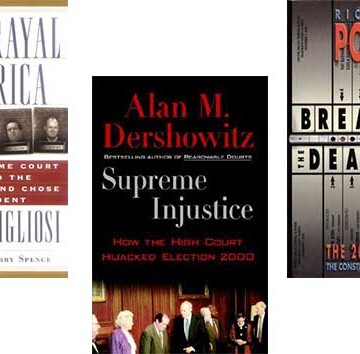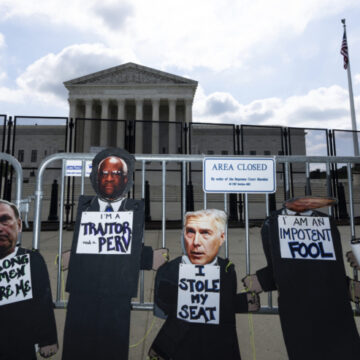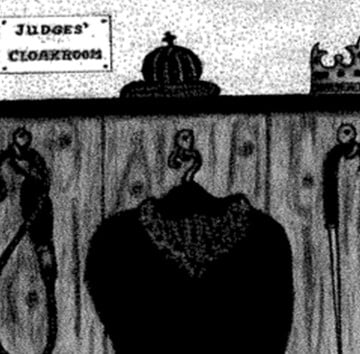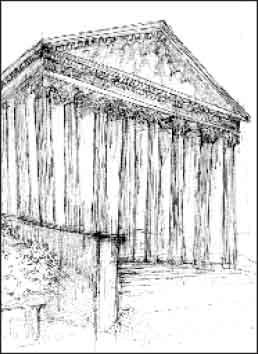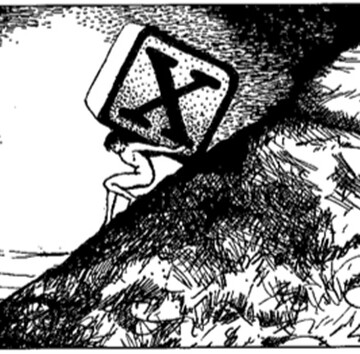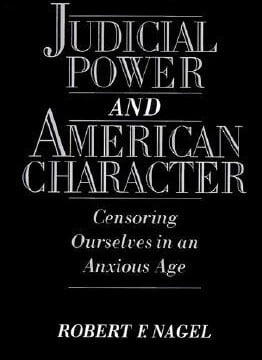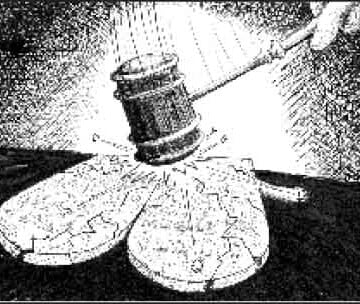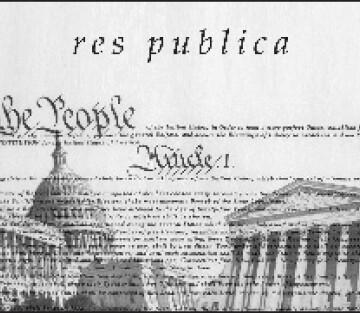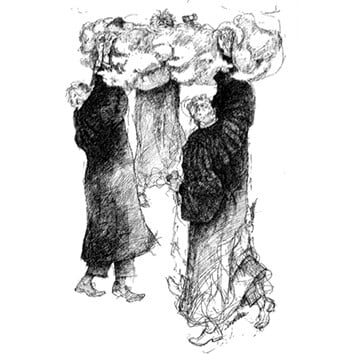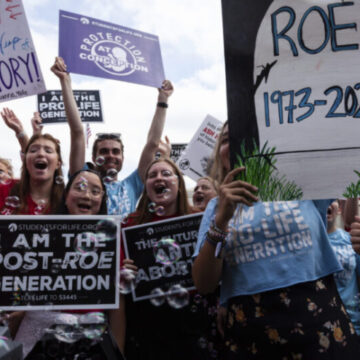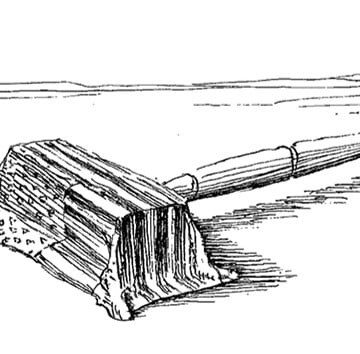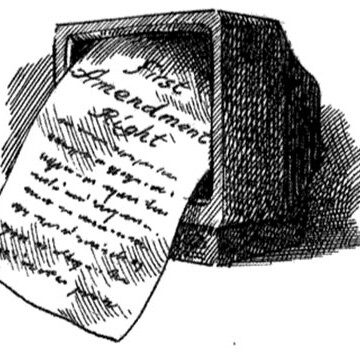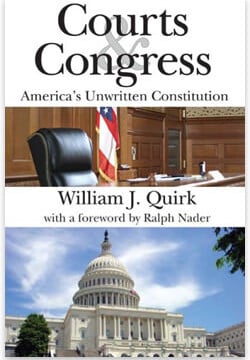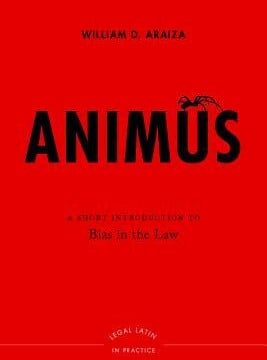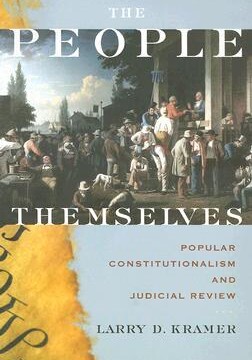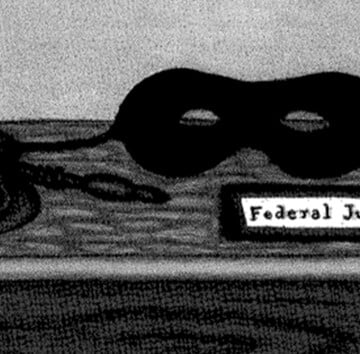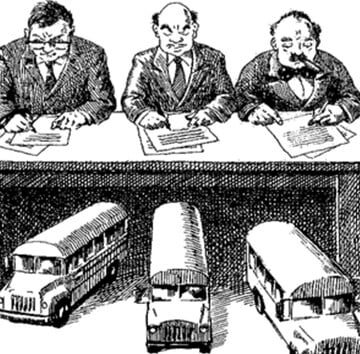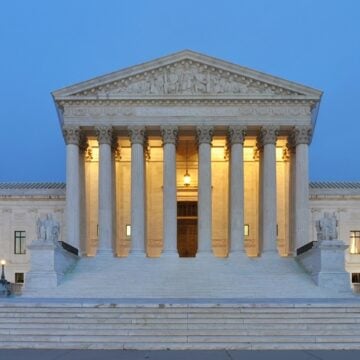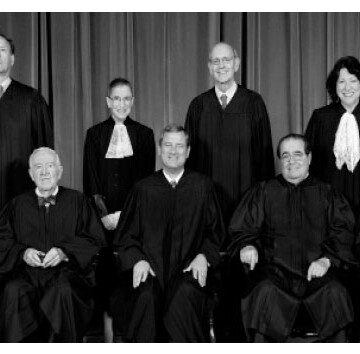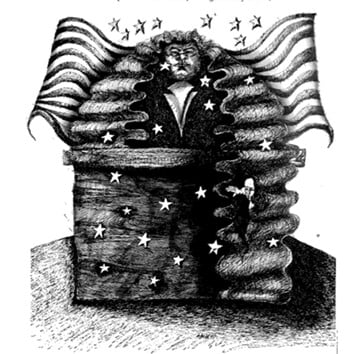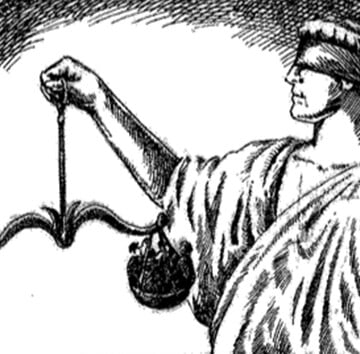On July 19, three days before H.R. 3313 was debated, the ACLU issued notice of an “Urgent Briefing” entitled: “How the Marriage Protection Act (H.R. 3313) Will Harm Civil Rights, and Violate the U.S. Constitution.” The flyer explained: “The bill would shut the federal courthouse doors—including the door to the Supreme Court—to an entire group...
1591 search results for: Supreme+Court
Some Dare Call It Justice
“Justice is a contract of expediency, entered upon to prevent men harming or being harmed.“ —Epicurus, Aphorisms According to leading members of the American law professoriate, the U.S. Supreme Court’s decision, on December 12, 2000, in Bush v. Gore was “lawless and unprecedented,” “not worthy of ‘respect,'” featured “sickening hypocrisy and...
Angels to Govern Us
“If men were angels,” James Madison wrote, “no government would be necessary.” Or, “if angels were to govern men, no controls on government would be necessary.” Madison believed that men are about as good as they can ever be, and since no angels are available to rule, we need checks and balances. Thomas Jefferson added...
The Fourth Choice: Ending the Reign of Activist Judges
If you are looking for a reason to vote for Ralph Nader, the way both parties are handling the “gay marriage” issue should give you lots of data. John Kerry, when asked his opinion of “gay marriage,” looks like a dog getting a bath, as Chris Hitchens puts it. Kerry says he personally opposes “gay...
The Fourth Choice
If you are looking for a reason to vote for Ralph Nader, the way both parties are handling the “gay marriage” issue should give you lots of data. John Kerry, when asked his opinion of “gay marriage,” looks like a dog getting a bath, as Chris Hitchens puts it. Kerry says he personally opposes “gay...
The Court Versus the Hydra Left
After Dobbs, the many-headed ruling class is licking its wounds … and itching for a rematch. The upcoming midterm election will measure the resistance to the Court's attempt to return to America's constitutional origins.
Gay Marriage: The Last Chance
“A Cinderella moment,” gushed a gay-rights advocate when the Supreme Court announced its two landmark decisions in June. California’s Proposition 8—an amendment to its constitution—went down (Hollingsworth v. Perry), as did the federal Defense of Marriage Act (United States v. Windsor). The New York Times saw a “huge and gratifying” victory for equal rights. The...
Why Is the Supreme Court So Slow?
Why does it take so long to get a decision from the Supreme Court on the constitutionality of President Obama’s healthcare law, or Arizona’s SB 170, or California’s Proposition 8 limiting “gay marriage”? Currently, those three cases are meandering their way around the lower federal courts. The Obama administration’s healthcare law is under attack by...
Is There Hope for the Federal Courts?
In a radio address last year, President Clinton railed against congressional Republicans who were stalling on his nominees to the federal bench and had even threatened some sitting judges with impeachment. Their actions, he claimed, had endangered our tradition of judicial independence, and were an attack on the rule of law itself. The truth, of...
Judicial Tyranny and Constitutional Change
What one man in America can decide that prisoners in South Carolina need croquet fields and backgammon tournaments and order the state to provide them? What one man can decide that Kansas City schools need Olympic-size swimming pools, a planetarium, a model United Nations wired for language translations, a temperature-controlled art gallery, and movie editing...
The Twilight Zone
The U.S. Supreme Court has put an end to five weeks of uncertainty. In the early days of December, in the twilight between the certification of George W. Bush as the winner of Florida’s electoral votes and the decision of the U.S. Supreme Court that the Florida Supreme Court was wrong to intervene, only one...
President Bush Can End “Gay Marriage” If He Wants To
In June 2003, the U.S. Supreme Court ignited our most recent culture war when it discovered a constitutional right to sodomize (Lawrence and Garner v. Texas). The Massachusetts Supreme Court then threw kerosene on the fire by finding that its constitution mandated “gay marriage” (Goodridge v. Department of Public Health). Americans from San Francisco to...
Sisyphus and States’ Rights
Can a ten-year-old girl successfully sue a local school board for failing to prevent the sexual harassment of the young lady by an elementary-school classmate? Should an Alabama state court judge be able to display his hand-carved copy of the Ten Commandments in his courtroom? Can the people of a state decide that no state...
What’s Next for the Imperial Judiciary?
“How much power Congress has to block Supreme Court consideration of the constitutionality of its laws is an open question.” This, the Washington Post said in a September 23, 2004, editorial, is “somewhat surprising.” The Post shouldn’t be so astonished, for the real surprise is that judicial supremacy—the doctrine that the Court interprets the Constitution...
Legal Insanity
“Knowing that religion does not furnish grosser bigots than law, I expect little from old judges.” —Thomas Jefferson A society governed by the judiciary—rather than by the will of the majority—displays odd characteristics. On July 29, 1994, a seven-year-old girl in Hamilton Township, New Jersey, was sexually assaulted and murdered. A neighbor who is a...
Gay Marriage, Before the Ruling
Justice [Antonin] Scalia: [W]hen did it become unconstitutional to exclude homosexual couples from marriage? 1791? 1868, when the Fourteenth Amendment was adopted? . . . Has it always been unconstitutional? . . . You say it is now unconstitutional. [Theodore Olson, attorney arguing that Proposition 8 is unconstitutional]: Yes. Justice Scalia: Was it always unconstitutional?...
The Federal Courts, a Menorah, and the Ten Commandments
A recent phenomenon in the United States is that no one knows any longer to what extent the country, our states, or our municipalities can participate in the display of such traditional religious symbols as crèches, crosses, menorahs, or even the Ten Commandments. Until the last half of the 20th century, no one seemed too concerned...
Judging for the People
For just about the last half-century, since Earl Warren became chief justice of the U.S. Supreme Court, the American legal academy has pondered something usually referred to as the “legitimacy problem.” Law-school professors have believed that there is a difficulty inherent in the fact that an unelected, isolated body of nine jurists working in a...
The (Politically) Supreme Court
The great sound and fury over the nomination of Robert Bork to the U.S. Supreme Court included many grand proclamations from all sides concerning the original intentions of the constitutionalists and the relevance of those intentions to our society today. It is clear to anyone with a modicum of knowledge about the great issues involved...
Overturn!
The overruling of Roe is the greatest triumph to date of the conservative legal movement. The Court had no business inventing a constitutional right to abortion.
The Lone Ranger’s Legacy
After serving for more than three decades on the U.S. Supreme Court, Chief Justice William Rehnquist died on Saturday, September 3, at the age of 80, having lost his battle with thyroid cancer. With Justice Sandra Day O’Connor’s recent announcement of her retirement, there are now two vacant seats on the Court. Just over a...
Suicide and States’ Rights
In early March, the Ninth Circuit Court of Appeals went exploring in the empty spaces beyond the text of the 14th Amendment and discovered a constitutionally protected right to suicide. Judge Stephen Reinhardt, writing for an 8-3 majority in Compassion in Dying v. Washington, went on to conclude that a Washington State law forbidding assisted...
Commercial Speech and the First Amendment
For sheer incoherence, incomprehensibility, and outrageousness, nothing beats the United States Supreme Court’s First Amendment jurisprudence. The First Amendment is a fairly simple piece of constitutional law: It forbids the federal legislature from restricting freedom of speech, freedom of the press, freedom of religion, or from establishing a national religious sect. Unfortunately, in the 20th...
Marriage and the Law
The Massachusetts Supreme Judicial Court’s 4-3 ruling, in Goodridge v. Department of Public Health, that the Massachusetts constitution—if not the federal Constitution—requires the state to allow same-sex marriages has thrown nearly everyone into a good old-fashioned tizzy. The Massachusetts court somehow discovered that it was “arbitrary” and “capricious” and therefore legally impermissible to limit the...
Losing Federalism
Human liberty has two distinguishable but inseparable dimensions: the liberty of the individual to act according to his own reason and the corporate liberty of a moral community to pursue a vision of the good lived out in institutions and traditions that bind generations. These two dimensions are necessarily in tension. The individual’s autonomy can...
Strippers to the Rescue
“Courts of justice cautiously abstain from deciding more than what the immediate point submitted to their consideration requires.” —Mr. Justice Nicholl In what was probably the most laudable achievement of his administration, President George W. Bush placed on the Supreme Court two justices, Chief Justice John Roberts and Associate Justice Samuel Alito, who believe...
The Court in Quandary
When the Fourth Circuit Court of Appeals affirmed the trial court’s preliminary injunction against President Trump’s executive order restricting immigration from certain countries, it cited Trump’s statements about Islam as its rationale. American Muslims challenging the ban had alleged injury of two types: First, the Muslim plaintiffs felt marginalized by the President’s characterizations; second, they...
Who Will Judge the Judges?
Abraham Lincoln, in his 1860 Cooper Union speech, asked, “What is the frame of government under which we live?” The answer must be, he said, the Constitution of the United States. The answer today, as Chronicles’ reviewer of Quirk’s and Bridewell’s Judicial Dictatorship stated in 1995, is a judicial dictatorship imposed by the Supreme Court. ...
The Last Word
What would the country be like if Congress added to every law it passed a section that said “No court of the United States or any state shall have power to review or interpret this act”? Such a proviso, popularly known as a “stripper,” prevents the Supreme Court from declaring the act unconstitutional. In the...
Supreme Court’s Drifting Days Are Done
This scrupulously objective book may be considered a gift to conservatives who have long despaired about the possibility of principled legal tenets regularly prevailing in Supreme Court opinions. For decades this long-suffering group has watched Republican Supreme Court appointees concur in various left-wing crackpot decisions that have become the law of the land. Thankfully, such...
When Judicial Supremacists Attack
Partisan. That’s the complaint many Americans have with the state of politics. The country would be better off, we are told, if only the Republicans and Democrats could put aside petty differences and work together. Can’t the left and right find some common ground and build on it? Unfortunately, when it comes to the power...
Men in Black
The U.S. Supreme Court is like one of those dinosaur reconstructions at which children gape when they are taken to a museum. Not only is the Court today an imaginative reconstruction of something that no longer actually exists, it is so huge an institution that few Americans are able to take it in all at...
Judicial Taxation: The States Respond
The Madison Forum was founded in 1993 by Missouri State Senator Walt Mueller and me for three reasons. First, we wanted to respond to the Supreme Court’s claim in Missouri v. Jenkins (1990) that the federal judiciary’ has the authority to levy or increase taxes. We believe this constitutionally baseless assertion by the Court poses...
It Ain’t Over ‘Til It’s Over
October 26, 2000, dawned pretty much like every other day here in Rockford, Illinois. After ten years of living under the dictatorship of a federal magistrate, we had decided that nothing would ever change. And then something did. On that glorious Indian summer morning, the Illinois Supreme Court, by a vote of six to one,...
No Duty to Retreat American Self-Defense
One of the most significant but little noted transitions from English to American society was in the Common Law of homicide and self-defense. As far back as the 13th century, English Common Law dealt harshly with the act of homicide. The “right to kill in self-defense was slowly established, and is a doctrine of modern...
The Takeover of Our Schools
It has become obvious that the majority of elected officials and candidates for public office are not qualified for their positions, and often stand in the way of attempts to institute the programs and diversity that are the hallmarks of modem society. Nonetheless, American voters, either because they are ignorant of what must be accomplished...
SCOTUS: What to Watch in 2016
Hope, as they say, springs eternal. Lately, those of us who believe in the rule of law and an objective interpretation of the Constitution according to the original understanding of those who framed it (and the people’s representatives who ratified it) have been dealt some cruel blows. The two most prominent are the Supreme Court’s...
Exit to Political Oblivion
Al Gore’s exit to political oblivion has no doubt delighted many conservatives. But there is nothing for conservatives to cheer about in the U.S. Supreme Court’s decision in Bush v. Gore, the instrument of Gore’s demise. The unsigned majority opinion concluded that Florida’s recount procedures violated the Equal Protection Clause of the 14th Amendment, because...
Recapturing the Constitution
In a landmark five-to-four decision last spring, in United States v. Lopez, the Supreme Court announced—for the first time in almost 50 years—that Congress had exceeded its interstate commerce powers. At issue was a federal statute—the Gun Free School Zones Act of 1990—which forbade the carrying of firearms within one thousand feet of a school....
The Struggle for the Soul of the Supreme Court
During Joe Biden’s 2020 campaign for president, when his fortunes were at their nadir, Joe Biden promised that he would nominate the first black woman to the United States Supreme Court. He reportedly made this pledge to James Clyburn (D-S.C.), the powerful African-American congressman, in return for Clyburn’s help in securing the black vote in...
The Worst Decision
Law professors like to debate among themselves which of the U.S. Supreme Court’s many opinions is the very worst. There has been a general consensus that the most loathsome is the one in Dred Scott v. Sandford (1857), in which the Court decided that the right to hold slaves in the territories was a “fundamental...
Obama Versus the Supreme Court
The Supreme Court’s power has become virtually unchecked: Amending the Constitution to reverse an erroneous Supreme Court decision is nearly impossible, and Congress has proved too timid to use the other weapons the Constitution provides to check the Court, including its power to restrict the jurisdiction of the federal courts. As a result, the Supreme...
A Perpetual Censor
When Supreme Court Justice Byron White announced his retirement from public life in March of this year, a shudder rippled down the spines of Washington conservatives. Previously, when one or another of the Court’s Nameless Nine had declared his intention to quit the pleasures of wrecking the laws and customs of local communities he had...
An Appointment to the Supreme Court
It was a beautiful day in May 1979 when the Georgetown University Law School held its commencement. Honorary degrees were awarded to Justice William J. Brennan, Jr., of the U.S. Supreme Court, and Judge John A. Danaher, of the U.S. Court of Appeals for the District of Columbia. It was an hour with extraordinary coincidence...
Judicial Editing and Congressional Inaction
Much has been written in recent years on how courts construe law, whether it is the Constitution or a statute. The discussion typically addresses the judiciary’s search for the “intent” of the framers or legislators and reflects a continuing debate on what limitations our system of government places on a court when it applies written...
The Gospel of Pluralism
“I esteem . . . Toleration to be the chief Characteristical Mark of the True Church.” —John Locke It is fitting that the most confused and confusing legal tradition in America today is First Amendment case law regarding religious liberty. It is confusing because at the Founding a young nation composed principally of strongly religious...
A Closely Watched Term
The Supreme Court’s closely watched October 1999 term came to an end on June 28, and its themes finally became clear: inconsistency, incoherence, and arbitrariness. On that last day, the Court released important decisions on abortion, aid to religious schools, and homosexual rights, and refused to intervene in the Elian Gonzalez case. The Supreme Court’s...
Crying “Halt!”
A federal judge whom I know lamented that the Supreme Court term that ended last June was the worst in recent memory. That judge loves the Constitution but could find few signs that this term’s key decisions were based on that document. A Court that can rule that medical marijuana grown for home use substantially...
After Obergefell: What Now?
I have previously suggested in these pages that the Supreme Court’s recent decision in Obergefell v. Hodges—the five-to-four decision which declared that two Americans of the same sex have a constitutionally guaranteed right to marry each other—may be the worst in the history of the Court. First, there was no adequate legal or constitutional basis...
Every Neighbor a Litigant
Goethe taught us that true happiness comes from being engaged with others in productive projects, and we have known since Plato and Aristotle that man is a social animal, but we would be hard put to reach these conclusions if our only guide were the current state of American law. Far too often the American...
